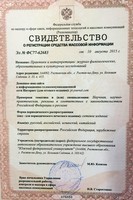
LINGUISTIC MASKING IN WILLIAM SHAKESPEARE’S “TWELFTH NIGHT”: VIOLA’S DISGUISE AS A REINCARNATION STRATEGY
Аннотация
William Shakespeare’s “Twelfth Night”. In this play the main character, Viola, employs language to secure the presence of her supposedly drowned twin brother Sebastian. Instead of accepting this loss, Viola devises a disguise plan: she decides to reincarnate Sebastian by becoming his copy. Masking also implies presenting a new image of identity, necessary to achieve specific goals in the course of the play. To construct an identity convincing enough to interact with the others, Viola recreates an image of the language associated with a certain social role. The pursuit of Sebastian’s image leads to the emergence of a diglossic character.
Key words: Shakespeare, “Twelfth Night”, Early Modern Studies, linguistic masking, diglossia, Mikhail Bakhtin, Judith Butler, gender, Doppelgänger, cross-dressing, Viola and Cesario.
DOI 10.23683/2415-8852-2017-1-42-53
 Цитировать:
Цитировать:
Rakhimov А. Linguistic masking in William Shakespeare’s “Twelfth Night”: Viola’s disguise as a reincarnation strategy // Практики и интерпретации: журнал филологических, образовательных и культурных исследований. 2017. Т. 2, № 1. С. 42-52.
Полный текст:
PDF (English)Литература
Barber, C.L. (2011). Shakespeare’s Festive Comedy: A Study of Dramatic Form and its Relation to Social Custom. Princeton: Princeton University Press.
Butler, J. (1990). Gender trouble: feminism and the subversion of identity. New York: Routledge.
Butler, J. (1993). Bodies that matter: on the discursive limits of “sex”. New York: Routledge.
Friedrich, P., & Redfield, J. (1978). Speech as a personality symbol: the case of Achilles. Language, 54 (2), 263‒288.
de Grazia, M. (1978). Shakespeare’s view of language: an historical perspective. Shakespeare Quarterly, 29 (3), 374‒388.
Hope, J. (2010). Shakespeare and language: reason, eloquence and artifice in the Renaissance. London: Methuen Drama.
Johnson, S., & Steevens, G. (Eds.) (1799). Plays of William Shakespeare: Vol. 6. Measure for Measure. Much Ado about Nothing. Basil: J.J. Torneisen.
Lachmann, R. (1988‒1989). Bakhtin and carnival: culture as counter-culture. Cultural Critique, 11, 115‒152.
Schalkwyk, D. (2005). Love and Service in “Twelfth Night” and the Sonnets. Shakespeare Quarterly, 56 (1), 76–100
Shakespeare, W. (2006). As You Like It. In J. Dusinberre (Ed.). London: The Arden Shakespeare.
Shakespeare, W. (2008a). Measure for Measure. In J.W. Lever (Ed.). London: Cengage Learning.
Shakespeare, W. (2008b) Twelfth Night. In K. Elam (Ed.). London: Methuen Drama.
Slights, William W. E. (1981). Maid and Man in “Twelfth Night”. The Journal of English and Germanic Philology, 80 (3), 327–348.
Traub, V. (1992). Desire and Anxiety: The Circulation of Sexuality in Shakespearean Drama. New York: Routledge.
Winny, J. (Ed.) (1957). The Descent of Euphues. Three Elizabethan Romance Stories: “Euphues”. “Pandosto”. “Plainness”. Cambridge:
Cambridge University Press.
Ссылки
- На текущий момент ссылки отсутствуют.
(c) 2017 Azamat Rakhimov
ISSN 2415-8852
Свидетельство о регистрации СМИ Эл № ФС77-62683 от 10 августа 2015 г.
Регистрирующий орган: Федеральная служба по надзору в сфере связи, информационных технологий и массовых коммуникаций (Роскомнадзор)
УЧРЕДИТЕЛЬ: ФГАОУ ВО "Южный федеральный университет".
344006, г. Ростов-на-Дону, ул. Большая Садовая, 105/42,
тел. +7 (863) 218-40-00 E-mail: info@sfedu.ru
Адрес редакции: 344006, г. Ростов-на-Дону, пер. Университетский, 93, к. 8, тел. +7(903) 43-12-321
e-mail: oadzhumaylo@sfedu.ru

Произведения доступны по лицензии
Creative Commons «Attribution» («Атрибуция») 4.0 Всемирная.

